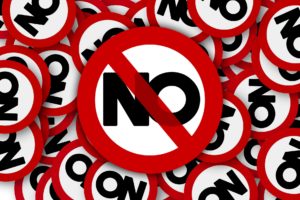 Those who lost in the presidential election are eager to find shoulders on which to place the blame. While some have considered whether it was partially the DNC for choosing to back Hillary Clinton (even though now in hindsight they admit she was a weak candidate choice), others tend to lean toward two camps of scapegoats: those who abstained from voting and those who voted third-party.
Those who lost in the presidential election are eager to find shoulders on which to place the blame. While some have considered whether it was partially the DNC for choosing to back Hillary Clinton (even though now in hindsight they admit she was a weak candidate choice), others tend to lean toward two camps of scapegoats: those who abstained from voting and those who voted third-party.
I’ll cover third-party voters in another post. This one is going to focus on those who abstained from voting.
In the 2016 election, a little over 46% of American citizens did not vote.(Incidentally, it should also be noted that overall voter turnout, despite there being many new registered voters, was down this year as from previous general elections.)
The general assumption and condemnation thrown toward abstainers is that they don’t care about the country or are too lazy to participate or are morally degenerate. And sure, there may be some who don’t vote because they are apathetic, but I’ve actually found far more who have other reasons for not voting. And the majority of these individuals are not morally degenerate. They’re upstanding citizens who have their own perspective on our government and the voting process.
Voting is a right in this nation, not a duty. Some people claim that it is a moral duty and the responsibility of all those who live within this democratic republic, but there are legitimate reasons why some might choose to abstain and why it shouldn’t be condemned. In fact, it is actually just as much your right to not vote as it is your right to vote so long as you are the one who is making the decision.
The importance of the ability to abstain has been confirmed to me in this election. Most people would agree, leading up to November 8, that there were two horrible choices (some people were rooting for a gigantic meteor to strike). And these are some of the reasons people might have chosen to abstain in this election and others.
Religious Tradition
Many religious traditions that prohibit voting do not just prohibit voting. They prohibit participation in most government forums and have done so for centuries. The reasons are many: 1) focuses should be on matters other than the physical world, 2) human governments are corrupt, 3) human governments sow division and discord, 4) governments cannot or will not promote complete pacifism, and so on.
Many Christian traditions, from the Anabaptists to Seventh Day Adventists to the Doukhobors, likewise abstain from political involvement from voting to running for political office though each one has varying degrees. When I was researching this, I stumbled across this quote from John D. Roth, “Voting, after all, is not just a ‘right.’ It is also a ‘rite’ — a ritual of identity and loyalty binding the individual to the nation. Abstaining from presidential elections could signal to our children and to the global church that our first loyalty is to the worldwide fellowship of Christian believers, not to the nation-state.” This is a common refrain in various forms across the religious traditions. The need for internal consistency, conscientious integrity, and so on override government participation (even when that sometimes leads to their formal or informal persecution). While there are many sections in Scripture that these individuals rely on for their position, many return to John 18:36 with Jesus’s statement that His kingdom is not of this world” as well as his lack of overall political involvement. This has softened somewhat in recent years becoming more of a personal choice of conviction with some while with others such as the Amish it remains true.
Buddhism can also be interpreted to be against political involvement, at least for monks. The Buddha said that monks should not speak about such things, suggesting that there are other more beneficial topics to consider. But many do engage in politics so long as they can make informed decisions and their consciences are at ease (which is often not an easy matter to resolve). However, it is still a source of frequent conversation and a matter that is often brought up for reflection given the fact that the government does not reflect most Buddhist teachings.
Even Islam has discussions on this topic. While some Muslims insist that voting and participating in political processes is essential, others maintain that it is essentially a form of idolatry because it places human laws above the law of Allah. A number of these individuals point to Surah Tawbah 9:31 where those who revere rabbis and monks are actually committing a form of idolatry with their reverence.
In my brief research binge on religious traditions that abstain from voting, I found a number of others including early Rastafarianism, Shaykhism, Baha’i Faith, Taoists, and some segments of Usuli. I’m sure that there are others. These all appear to be rooted in the same motivations and  concerns: compassion, harmony, and conviction.
concerns: compassion, harmony, and conviction.
Also, it’s important to note that there are many agnostics and atheists who abstain from voting for similar reasons without requiring a religious or spiritual mandate. They are often pacifists who focus on what is similar rather than dissimilar, promoting harmony and civil discourse.
Note: I am not sure what percentage of those who abstained from voting falls into these categories. I did ask a couple of my friends who do follow the “no voting” policy and “no government involvement” whether they register to vote and if so why but I did not get a response yet. If I do get a response and their permission to share it here, I’ll add that later.
For some this may be as simple as conversion after already being registered to vote.
Inability to Agree with Candidates
In some cases, even those who vote may find certain issues that are essentially dealbreakers. In this last election, there were many people who could not bring themselves to vote for either of the two major candidates and who were unwilling to vote for the third-parties either due to their beliefs about their ineffectiveness or lack of agreement on third-party stances as well.
These individuals see their votes as being an outright endorsement of the candidate’s beliefs and practices. Others do not, claiming things such as “lesser of two evils”and “pragmatism.” (In fact, one of the things that we are seeing in this election is a loud set of voices insisting this very thing, that all Trump voters believe what the media says Trump believes and all the things that Trump has said. It may be being said about Clinton voters, but I haven’t seen that one.) Total harmonious agreement is often not the case when it comes to conscience and politics. While some can parse out what they agree with, focus on those issues, and rearrange their priorities, others cannot.
Making Another Statement
Some people choose to refrain from voting to make a point. That point might be because they cannot support any of the candidates, because of the parties’ treatment of their constituencies, or because of general dissatisfaction with the state of the country. Now, you might be arguing that in all of these regards, voting would be the more productive method for enacting change but not from these people’s perspectives.
Such individuals tend to be quite pragmatic (at least the ones I know), and that extends to the  time that they invest in various causes or endeavors. If you believe that the government is irrevocably corrupt, you may not see any benefit in putting your time into the system. You may then put your time and efforts elsewhere. Often these individuals do make public the fact that they did not vote and why, which can be helpful for cultivating change.
time that they invest in various causes or endeavors. If you believe that the government is irrevocably corrupt, you may not see any benefit in putting your time into the system. You may then put your time and efforts elsewhere. Often these individuals do make public the fact that they did not vote and why, which can be helpful for cultivating change.
Seeing their votes as not being counted may be another reason. This sometimes stems from a misunderstanding of what the electoral college does or an outright disagreement with it. But again, another conversation for another day.
Inability to Make an Informed Decision
Now by this, I don’t mean that these people are stupid. Far from it. But the voting process, whether on legislation or representatives, can be a difficult path to navigate if you want to be informed. Many are inclined to assume that they know everything about a situation and can cast an informed vote, but, if random interviews on the street are any indication of current political intelligence, that is not the case.
Becoming informed on key issues is quite the minefield that does take time. Bias exists everywhere along with misinformation and propaganda. Take this last election for example. If you have the time, go pull up media reports and stories from the opposing perspectives (definitely do not rely on the mainstream media for this). Look at the vastly different information being presented.
This disparity of perspective to reality is exceptionally jarring. Even as an involved voter who reads as much as she can get her hands on, I have to confess…sometimes I don’t know if I am making an informed decision, I’m just shooting in the dark and hoping I make the right call.
Not surprisingly, some people decide that they do not have time to make an informed decision…often because they do not have the time, and so, rather than risk making a situation worse, they abstain.
Anecdotally, one of the first that comes to my mind is a friend whose mother has Alzheimer’s. She cares for her mother while also teaching. I’ve offered to help how I can, but in our conversations, she’s admitted that she is just, at the moment, too emotionally exhausted to get involved. And that is all right. She is doing everything she can at the moment. Political involvement is not a requirement to be a good citizen/person/steward.
One Small Caveat
If you are someone who chooses to abstain from voting but publicly criticizes the government, it may be beneficial to explain why you abstain and what can still be done to impact the government or what you believe the steps should be. Otherwise, and perhaps even so, you may be accused of hypocrisy.
Concluding Thoughts
There are many reasons that almost half of American citizens did not vote, and it isn’t indefensible. The United States of America is a country that supposedly embraces many beliefs. And while it can be argued that the US cannot accept beliefs that are antithetical to its core, the decision to abstain from voting is certainly not one of those.
The reality is that we cannot say for certain how those voters would have cast their votes if they had been compelled to vote against their consciences, priorities, and beliefs. But we cannot simply assume that those who did not vote simply did not care. They do not deserve to be blamed for following their convictions, nor should it be assumed that they are not valuable members of our society. If someone states that they didn’t vote just because they don’t care, by all means, politely engage and discuss the reasons. But abstention from voting is not proof that someone is bad, immoral, lazy, or apathetic.